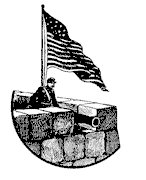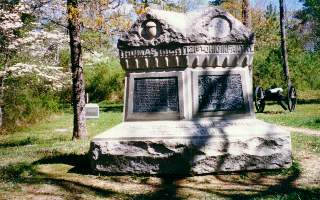121st Ohio Volunteer Infantry

Company H. Website
History of the 121st OVI

The 121st Monument on Snodgrass Hill, Chickamauga Battlefield
The 121st Ohio was organized at Camp Delaware, Ohio September, 1862, and was composed of recruits from Knox, Delaware, Logan, Marion, and Morrow Counties, the majority of whom were farmers and without a knowledge of even the first principles of military tactics.
On the 10th of September the regiment, nine hundred and eighty-five strong, left Fort Delaware for Cincinnati, where it was supplied with worthless Prussian muskets, and place on guard-duty about the city. It left Cincinnati on the 15th of September, crossed over the river to Covington, Kentucky, and went into camp. Remaining here only five days, the regiment, under orders, proceeded to Louisville, and was there assigned to Colonel Webster's brigade, of Jackson's Division, and McCook's Corps. Up to this date the men had not been drilled an hour, and, of course, were totally unfit for service in the field. In this unprepared state the regiment was joined to, and marched with, General Buell's forces, in pursuit of Bragg's Rebel army of veteran soldiers.
The only stirring event of this march was the battle of Perryville, in which the regiment participated at great disadvantage, and, of course, did not win much reputation for military efficiency. Captain B. F. Odor of Company K was killed in this battle.
The regiment was detailed to remain on the battlefield to look after the wounded and bury the dead. It remained in Kentucky, doing guard-duty, and looking after John Morgan's guerrillas up to January 1863, and was then taken in transports to Nashville, Tennessee, leaving Louisville about the end of January. From Nashville it went to Franklin, arriving there in February, where it performed service in watching and protecting the right flank of General Rosecran's army, then lying at Murfreesboro.
On March 27, on the application and petition of all line and field officers of the regiment, Lieutenant Colonel Banning, of the 125th Ohio, was detailed by General Gordon Granger to take charge of the regiment and drill and discipline it; and it was not long before it became one of the best regiments in the brigade to which it was assigned. At the request of GeneralRosecrans, Lieutenant Colonel Banning was transferred by order of the WarDepartment, to the command of the 121st.
Nothing of moment occurred while the regiment lay at Franklin. When Rosecran's army moved forward from Stone's River, the regiment moved with it and was attached to the Reserve Corps, under command of General Granger.
At Triune, on this march, the regiment was attacked by the Rebel General Forrest. After a sharp fight, Forrest was driven back. This affair infused confidence in the men and taught them the value of drill and discipline. From Triune the army moved forward, and on the 3rd of July, the 121st entered and occupied the town of Shelbyville, Tennessee, remaining there about three weeks. While in this camp, the men drilled morning and afternoon, notwithstanding the intensely warm weather. About the 25th of August, the regiment was ordered to occupy the town of Fayetteville in Lincoln County, Tennessee, a strong Rebel district, situated 25 miles from any other post. Colonel Banning occupied the town, barricaded the public square, and went into camp, notifying the citizens that in the event of being attacked, he would burn the town. The place was held for about ten days, all of which time spent drilling by the men. On September 5, orders were received from General Steedman to proceed to Cowan, on the Chattanooga Railroad, by the way of Winchester, where it joined the Reserve Corps, and proceeded to Chattanooga, and on the 15th, went into position at Rossville, eight miles south of Chattanooga. On the 17th, the regiment, in company with the 113th Ohio, under the command of General Steedman, made a reconnaissance to Ringgold, and reached the place in time to witness the arrival of Rebal re-enforcements from Longstreet's Corps. Next day at ten a.m. it fell back to its old camp at Rossville, and at 6:00 moved to the relief of Colonel Dan McCook's brigade, which was engaged with the enemy near Rossville, reaching its camp on the morning of the 19th.
On the afternoon of the 19th the regiment was ordered to the support of General Whittaker, on the Ringgold Road. It took up a position on the left of the road and bivouacked for the night. At 10:00 a.m. on the 29th, the regiment became fully engaged in the Battle of Chickamauga, forming the right of Steedman's division of the Reserve Corps. In the charge made by the regiment to save the only remaining road to Chattanooga, it performed feats of bravery second to no other in the army, and won for itself an enduring name. The battle cry of the men was "Wipe out Perryville!" and well they did. They met and vanquished the 22nd Alabama Infantry, capturing its colors and a majority of the regiment itself. The enemy was driven back and the road held, but not without severe loss. Five officers were killed; seven were wounded. Privates killed: 14; wounded: 70; missing: 3, undoubtedly killed as they were never hear of again.
Falling back with the army behind the entrenchments at Chattanooga, the regiment took position on the right, and in the reorganization of the army was assigned to the Second Brigade, Second Division, 14th Army Corps, and remained quietly in Chattanooga until battles of Lookout Mountain and Mission Ridge, in which engagements it took a prominent part.
After these battles the regiment again occupied its old camp at Rossville and recruited its attentuated ranks. It remained in this camp until the 2nd of May, 1864, when it moved the the army on the Atlanta campaign.
The first engagement on this campaign in which the regiment participated was that of Buzzard's Roost, on the 8th of May. It drove the enemy from an important position at the mouth of the gap. At Resaca it covered the retreat of General Judah's brigade from the charge in which it was repulsed. When the enemy retreated from Resaca, the regiment formed a part of General Jeff C. Davis's division in its movement on and capture of Rome, Georgia. In this affair the regiment was complimented by the brigade commander for having been first inside the city.
By June 19th the regiment had reached the foot of Kenesaw Mountain. It suffered severely, losing eleven men killed and wounded. On the evening of the 26th, Colonel Durbin Ward relieved the regiment from this position, which that officer named the "Valley of Hell". At 10:00 a.m. the day following, the regiment formed part of the charging column of the 14th Corps upon Kenesaw Mountain, and in that disastrous affair lost 164 officers and men killed or wounded. It succeeded in taking a lodgement close up under the enemy's works and held it, thereby securing the possession of the National dead and wounded; but dearly did the regiment pay for its bravery. Four officers were killed, eight were wounded.
On the 28th, a determined charge of the enemy in front of Kenesaw was repulsed. On July 9th, the regiment was engaged at the railroad bridge over the Chattahoocie River and lost five killed and four wounded. It then went into position on the north bank of the Chattahoocie until the 17th. It crossed the river on the morning of that day, engaged the enemy, and occupied his position. On the 22nd the regiment joined its brigade and took position on the right of the National line, three miles from Atlanta. It remained in this position until the 4th of August when it moved forward and occupied a position on the Sandtown Road. While constructing works, it lost one man killed, and one officer and four men wounded. It again advanced its line on the 5th, 6th, and 7th, losing nine men wounded. The works of the enemy were occupied.
On the 28th of August, the grand flanking movement to Jonesboro was commenced. The 121st took the advance in this movement acting as skirmishers for the Second Division, leading the Column of the 14th Corps. It became hotly engaged with the enemy immediately after passing through the earthworks of the Fourth Corps, and drove him five miles across the Montgomery Railroad. In this affair, one man was killed, and two officers and six men wounded.
The regiment, on the 30th, moved with the iarmy in the direction of the Macon Railroad, and on the 1st of September occupied a position one mile north of Jonesboro to the right of the Railroad. At 4:00 p.m. a charge was made on the enemy's works, carrying them, and capturing Govan's rebel battery and many prisoners. This affair forced the enemy to retire from Jonesboro and it fell into the hands of the National Army.
The Jonesboro capture ended the Atlanta campaign. The Rebels having evacuated Atlanta, that city was occupied by the National forces on the 8th. Thw whole army went into camp around Atlanta, and the official reports of the campaign were made. From Colonel Banning's report of the opeerations of the 121st, we copy the following: "I started with 429 non-commissioned officrs and men, and 18 commissioned officers. Four officers were killed and eight wounded; 22 men were killed upon the field, and 205 wounded; one captured."
The regiment remained in camp about three weeks resting the men and putting the regimental affairs in proper shape.
For ability as a commander, and distinguished conduct on the Atlanta campaign, Colonel H. B. Banning was, on the recommendation of General Jeff C. Davis, brevetted a Brigadier General of Volunteers.
About the 29th of September, the regiment was sent back to Chattanooga by rail, where, on its arrival, it was attached on the Chattanooga and Nashville Railroad. It followed the Rebel cavalry and drove it across the Tennessee River into Alabama. It then returned to Chattanooga and took part in the chase after Hood's army. Joining the forces under General Sherman at Rome, Georgia, the regiment marched with the expedition to Savannah and the sea. At Rome, Georgia, Colonel Banning reported to General Steedman for orders, and the command of the regiment devolved upon Lieutenant Colonel A. B. Robinson, who led it to Savannah, and up to its final muster-out.
After the fall of Savannah, the regiment joined the expedition through the Carolinas. At Bentonville, where the National forces were engaged with the enemy, it took a prominent part, and lost six men killed and twenty wounded.
Reaching Goldsboro, the regiment went into camp near the town and remained there about ten days. This takes the history of the regiment up to the 10 of April, 1865. About that time, it moved to Raleight and at that place, received the news of Lee's surrender and the fall of Richmond.
The regiment moved from Raleigh to Cape Fear River. In the meantime, General Johnston's Rebel army had surrendered to General Sherman. April 22, it fell back to Holly Springs and went into camp. This ended the campaign of the 121st OVI. On the 1st of May, it joined the march of the National Forces through Richmond to Washington and participated in the grand review.
The regiment was then mustered out and sent home. It was paid off and discharged at Columbus, Ohio, June 12, 1865.
Colonel H. B. Banning, the commander of the regiment, was breveted a Major General "for gallant and meritorious services during the war."
Mail the Editor:
Proud Member of:
The Army of The Ohio
Proud Member of:
The Western Brigade
Please contact our Webmaster with questions or comments.
© Copyright 1996 121st OVI